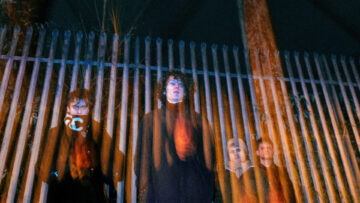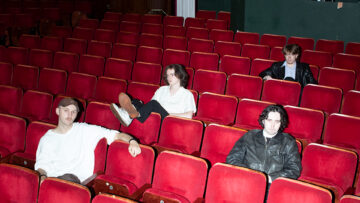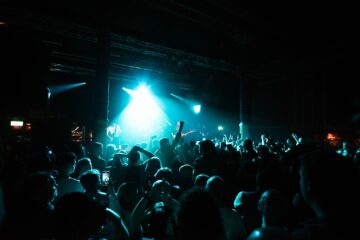Varied in style and timbre, there remains a consistent depth and almost eerie quality throughout this record – a reflection of the River Lethe it’s named after, which derives from Greek mythology.
The follow-up to 2018’s Gravity Pairs, this latest effort is also the first since the duo left the esteemed label Ghostly. We speak to the duo about how they formed, their influences outside of music and the making of Along the Lethe.
Bjarne Takata
How did you guys form Beacon?
Jacob: Tom and I met in 2006 on the first day of class at the Pratt Institute of Art and Design. I have a Schiele painting tattooed on my left arm, and he’s one of two people that have ever correctly identified with the work – I just had to befriend him after that. We quickly built a relationship around collaborative projects, which inevitably led to forming Beacon around 2009/2010.
Thomas: Yes, we met that first week of classes at Pratt in Brooklyn. Our Light, Color, and Design class in foundation year. We actually first collaborated on an arts magazine we started a few years before performing music together in galleries.
Describe the DIY Brooklyn scene you Beacon came from, and how it’s influenced you as a duo..
Jacob: Brooklyn was such a vibrant place during the early years of this band. We started playing shows weekly, and gigging around venues like Glasslands and Cameo really shaped a lot of what was to come for us. There was a real sense of community, early supporters and inspiring artists that in retrospect was invaluable to the development of this project.
Thomas: We essentially played shows every weekend when we were starting out, sometimes two or three a week. The first under the Beacon name was played at Glasslands in 2009 and we played there again during their closing week of shows in 2014.
When I think back to it now, the most influential aspect of that time and place was the breadth of DIY venues you could play. We didn’t really know any of the other bands we were playing with and it would be a bit chaotic and a complete genre clash, but we loved it and basically never said no.
Which artists or musicians did you particularly bond over?
Jacob: There were so many, but one that jumps out in particular is Blur. I have fond memories of driving around Brooklyn listening to Think Tank and chatting about how amazing that record is.
![]()
Thomas: We bonded over some visual artists early on, sculptors like Tom Friedman and Rachel Whiteread. We were both big fans of Blonde Redhead as well, which we saw in 2007 before starting Beacon. We eventually got to open for them so that was a full circle moment for us.
The video for ‘Until Next Time’, released last month, is very performative and arresting; and I understand you directed it, Jacob. Given you both went to art school, how important is art beyond music for Beacon?
Jacob: It’s everything to me. I’m such an intensely visual person and my relationship to music is born out of the visual arts. Though everything essentially funnels to the music, this band has been a total expression of our creative work. Shooting and directing videos, visual design and animation for the live show, photography and concept design for art, the whole Beacon enterprise is very much a multidisciplinary affair.
Your sound has been praised for its blend of sounds. How would you describe your sound and what you’re trying to create, musically?
Jacob: It’s always evolving, and it feels less concerned with genre and particular markers as time moves forward. At its core we are just searching for music that moves us, and in turn hopefully others. I think there can be a real cathartic experience with our music, and the route we take to get there takes many forms.
Thomas: I think a lot of times we’re working backwards. We’re often building a song to fit the sounds we’ve excavated from our instruments rather than finding a way to articulate something that’s been “written.” And I think, as a result, our songs inhabit these viceseral sonic environments and spaces they were born out of. That’s how I think of them at least.
Your forthcoming album, Along the Lethe, is set for release in September. (Congratulations, by the way, it’s beautiful). First, why that choice in name?
Thomas: Thank you. The name of the album is a lyric in the song “Pay My Debts.” “I leave my thoughts, along the Lethe. No more regrets, no more regrets” From Greek mythology, souls passing through the underworld could drink from the River Lethe and forget their earthly lives. It was a place to erase a personal history. This record confronts quite a bit of personal and collective trauma, and the allure of forgetting is one of the ways we reckon with that.
Thomas, I read that you’ve described the track ‘Until Next Time’ as Beacon’s “atmospheric re-entry”. How does this album compare to your previous releases, would you say?
Thomas: There are references and markers to our past music in this album, the music always contains histories, but Along the Lethe has a very distinctive voice unto itself. It’s also quite literally us emerging from the fog of the pandemic, picking up our role as touring musicians again and confronting whatever that means in 2022.
Along the Lethe is a very multi-layered album, (it reminds me of the textures of Radiohead’s The King of Limbs). How long has this album been in the making overall, and what was the overall creation of it like?
Jacob: The records’ first moments date back to just before the pandemic, but the bulk of it was written during the height of lockdown. All in all it’s been about four years. Writing it was one of the most challenging and creatively fruitful periods of my life. Its roots took hold mostly in isolation, with early ideas moving back and forth via email. This was followed by a long and painstaking period in the studio endlessly developing material.
Thomas: That’s a very flattering comparison because ‘Bloom’ from that record is one of my favorites. It came out right around the time we released our first EP. The way I’ve really been thinking about things, having made four records now, is they end up becoming chapters of my life.
This record will come out four years after our last one and it feels a bit like an entire lifetime is contained within those four years. The studio change was quite a big deal sonically, as we really do have many more options for marrying acoustic or organic sounds with our electronic signatures.
![]()
You were previously with Ghostly Records but have decided to release Along the Lethe on your own. Why so?
Jacob: There were many challenges to making this record become a reality, and maybe none more consequential than our break with our long time label. With the industry as a whole recoiling, and our main support system vanishing somewhat overnight, we had to regroup. We’ve been doing this for over a decade and it felt like a moment to begin to build something for ourselves. Along the Lethe marks the beginning of that journey.
Which artists particularly excite you right now, who you feel aren’t getting the attention they deserve?
Jacob: This producer named Ben Hixon out of Brooklyn is making a lot of interesting music. He’s super active in a lot of different music spaces and is making some great House, among other things. I’ve been buying up his vinyl of late.
Thomas: I love this release by composer Phong Tran called ‘The Computer Room’. He creates lush instrumental compositions paradoxically built from layers of rudimentary-sounding waveforms. It’s a great experimental release and came out on New Amsterdam Records last year.
If you could have created any album ever, what would it be and why?
Jacob: That’s tough, but I’ll go with D’Angelo’s Voodoo. It’s one of those records where I can’t really comprehend what it takes to get there. There’s a certain level of musicianship that feels really singular.
Thomas: Hmm, let’s go with Christian Marclay’s Record Without A Cover. For sure.
What are you up to this summer? Where can fans expect to see you perform live?
Jacob: We’ll be hitting the road in September, starting in NY. We have a run of shows in the US and then off to the EU and UK in mid-November. We can’t wait to take this record into the live setting.
Thomas: Building our new live show and then back on the road again starting in September. Feels right that our first show back will be in Brooklyn on 10 September, at Public Records.
Along the Lethe arrives on 9 September on the band’s imprint, Apparent Movement.




